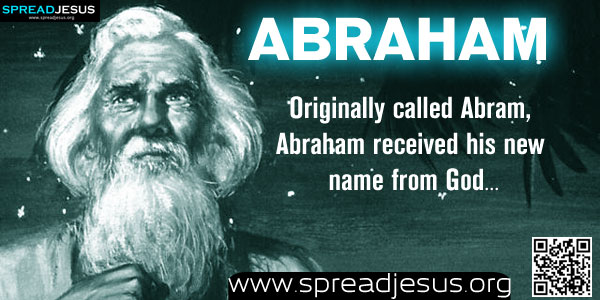Biblical Definition Of ABRAHAM
Biblical Definitions 28-12-2023, 19:50

Biblical Definition Of
ABRAHAM
Originally called Abram, Abraham received his new name from God in confirmation of God’s promise that he would be father of a multitude of people (Gen 17:5-7). In fulfilment of this promise, Abraham became the physical father of the Israelite nation (Matt 3:9; John 8:37). Because he accepted God’s promise by faith, he is also the spiritual father of all who accept God’s promises by faith, regardless of their nationality. As God in his grace declared Abraham righteous, so he declares righteous all who trust in him (Gen 15:6; Rom 4:11).
Response to God
Abraham was brought up in Mesopotamia, and the people among whom he lived were idol worshippers (Gen 11:28-31; Josh 24:2). But he worshipped the one true God (Gen 14:22; 18:25; 21:33). Abraham gave proof of his faith by obeying God when God told him to move out from his family group to a new land to which God would direct him (about 1925 BC; Gen 12:1,4; Neh 9:7; Acts 7:2-4; Heb 11:8-10). God’s purpose in choosing Abraham was to produce through him a nation (Israel; 2 Cor 11:22), to give that nation a land to dwell in (Canaan; Gen 12:5-7), and to bring from that nation one man (Jesus Christ; Rom 9:4-5) who would be saviour of the world.
Through Abraham, people of all nations would receive the life-giving blessing that God had prepared for the world (Gen 12:1-3; Gal 3:14,29). At the time of their migration to Canaan, Abraham and his wife Sarah (originally Sarai) had no children. Abraham was at that time seventy-five years of age. He and Sarah were accompanied by Abraham’s nephew, Lot, and a large household of labourers whom Abraham needed to look after his flocks, herds and working animals (Gen 12:4,16; 14:14). A drought in Canaan convinced Abraham that he should look for better pastures in Egypt. But the Egyptian ruler found him deceitful, and Abraham was forced to leave Egypt in disgrace (Gen 12:10,20; 13:1).
Nevertheless, Abraham and Lot continued to prosper. In fact, they became so wealthy that when they returned to Canaan, they had to settle in different parts of the land to prevent trouble between their households (Gen 13:1-2,6). Lot settled in the fertile region east of the Dead Sea (Gen 13:10-11). Abraham settled in the centre of Canaan, and received God’s reassuring promise that one day his descendants would possess Canaan as their national homeland (Gen 13:14-18). Later he rescued Lot from an invading army of Mesopotamians. He demonstrated his belief that God alone controlled Canaan’s affairs, when he made a sacrificial offering to God’s priest (Melchizedek) and refused to accept any reward from the Canaanite rulers (Gen 14:1-24; cf. Heb 7:1-2,4,6).
God’s covenant
God’s promise to Abraham (namely, that he would be the father of a great nation) originated entirely in the sovereign will of God. God chose Abraham, Abraham believed God’s promise, and in response God accepted Abraham as righteous (Gen 15:6). In confirmation of his promise, God told Abraham to prepare a covenant ceremony where normally the two parties to the covenant would pass between the parts of slaughtered animals. In this case, however, only God (symbolized by a smoking fire-pot and a flaming torch) passed between the animals, showing again that God alone took responsibility to fulfil the covenant promises. All that Abraham had to do was believe (Gen 15:7-10,17-21).
After ten years in Canaan, Sarah and Abraham had not been able to produce a son. Sarah therefore suggested that Abraham obtain his son through their slave-girl, Hagar (Gen 16:1-3). But the son born of this relationship was not the one God had promised. Abraham’s promised heir would come through his wife Sarah. It was at this time that God gave the names ‘Abraham’ and ‘Sarah’. The new names emphasized that they would yet be the parents of a multitude of people (Gen 17:1-7,15-19). In further confirmation of his covenant with Abraham, God commanded Abraham and all future male descendants to make a permanent mark in their bodies. This mark, circumcision, was both a symbol of God’s faithfulness to his covenant and a sign that Abraham believed God’s promises and acted upon them. Circumcision sealed Abraham’s faith and demonstrated his obedience (Gen 17:9-11; 17:23; Rom 4:9-12; Acts 7:8).
Sarah found it difficult to believe that she would yet have a child. God had just reassured Abraham (Gen 17:17-19), and now he sent heavenly messengers to reassure Sarah (Gen 18:9-14). The same messengers told Abraham that judgment was about to fall on the wicked cities of the region where Lot lived (Gen 18:16-21). Abraham hoped that God might spare the cities, but he did not realize how bad they were. The cities were destroyed, though Lot escaped (Gen 18:32; 19:29).
Abraham’s heir
Upon moving with his flocks and herds into the Philistine region, Abraham again brought disgrace upon himself when he deceived the ruler in whose territory he dwelt (Gen 20:1-3). This failure of Abraham, particularly at a time so close to the birth of the promised son, showed again that God’s blessing upon Abraham depended entirely upon divine grace, not upon human good works (Rom 4:1-5). The promised heir, Isaac, was born to Abraham and Sarah when Abraham was about one hundred years old. Abraham had accepted God’s promise by faith, in spite of the apparent impossibility of such an old couple producing children. God was faithful to his promise (Gen 21:2-3; Rom 4:17-21).
An even greater test of faith came when God told Abraham to offer his son as a human sacrifice. If Isaac was killed, God could no longer fulfil his promise of a multitude of descendants for Abraham through Isaac. Yet Abraham obeyed, believing that God could bring Isaac back to life (Gen 22:1-2; Heb 11:17-19). Abraham’s obedience proved the genuineness of his faith. Though he offered Isaac, he did not kill him. God provided a substitute, and Isaac’s life was given back, as it were, from the dead (Gen 22:13; Heb 11:19; James 2:21-24).
When Sarah died, Abraham bought a piece of ground within Canaan as a burial place for her. In doing so he showed once more his faith in the ultimate fulfilment of God’s promise concerning his descendants’ permanent homeland. He now legally owned part of the territory which they would one day possess (Gen 23:1-4,16-20; cf. 49:29-33).
Since Isaac was to succeed Abraham as heir to Canaan and ancestor of the promised nation, Abraham required Isaac to remain in Canaan but not to marry one of the Canaanite women. He therefore sent his chief servant north to find a wife for Isaac among Abraham’s relatives (Gen 24:3-6). The Genesis account of Abraham concludes with the note that he had other descendants through minor wives, but these were not part of the promised nation (Gen 25:1-6). One hundred years after first moving to the promised land, Abraham died (Gen 25:7). He was buried in the burial ground with Sarah, as a final demonstration of his faith in God’s promises (Gen 25:8-10).
Example of faith
Repeatedly, the New Testament refers to Abraham as an example of the truth that God accepts people and declares them righteous on the basis of faith. The Jews had to learn that physical descent from Abraham was no guarantee of salvation (Matt 3:9; John 8:39-44; Rom 9:7). The case of Abraham shows clearly that salvation has nothing to do with personal good works (Rom 4:1-5), religious rituals (Rom 4:9- 12) or the law of Moses (Rom 4:13; Gal 3:16-18). It is entirely dependent upon God’s grace and is received by faith (Rom 4:16).
The promises given to Abraham find their ultimate fulfilment in Jesus Christ, through whom people of all nations are saved (Luke 1:72-73; Gal 3:8,14,16). When believers become Christ’s people, they become, through him, Abraham’s descendants also, and so share in the blessings promised to Abraham (Rom 4:16-17; Gal 3:9,29; Eph 3:6).
Abraham’s faith is a further example in that it is not only a faith that saves, but also a faith that the true believer lives by. Abraham’s offering of Isaac showed that faith proves its genuineness by obedience (Heb 11:17-19; James 2:21-23). Always Abraham looked beyond his immediate circumstances, believing that God would give him a better and more lasting dwelling place (Acts 7:5; Heb 11:8-10,13-16).

St Hilarion the Great Abbot Confessor (c.291 - c.371) Saint of the day October 21 Born of pagan parents,...
Learn more
Sirach Chapter-5 Sirach 5:1 Do not choose to seek iniquitous possessions, and you should not say: “I have...
Learn more
PSALM 26 Plea for Justice; and Declaration of Righteousness Psalm 26:1 Vindicate me, O LORD, for I have...
Learn more